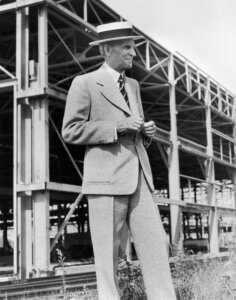The head of the Ford Foundation condemned antisemitism — here’s why that’s a huge deal
Given Henry Ford’s notorious record on the Jews, it was heartening to see Ford Foundation president Darren Walker take a principled stand

A 1949 Ford convertible. Photo by Getty Images
It was nothing less than astonishing to see Darren Walker, the president of the Ford Foundation, issue a statement condemning both antisemitism and Henry Ford’s part in perpetuating it.
“We must look to the lessons of history,” Walker wrote in a message that was issued in time for the High Holidays, “that there can be no reconciliation without atonement, no justice without accountability.”
This statement, coming from a foundation that claims to be “a $16 billion international social justice philanthropy,” deserves more attention and discussion than it has received so far. It concerns America’s past as well as its present, and Jews in America, then and now. Most deeply, the message is about accountability.
“I feel this obligation acutely as the leader of an institution that protects and promotes democratic values, which also was founded by Henry Ford — an icon of innovation, and industry, and philanthropy, and one of the twentieth century’s most virulent American antisemites,” wrote Walker.
First things first
First and foremost, it’s amazing to see the leader of a foundation funded by Henry Ford take a stance on antisemitism. In 1938, the Nazis gave Ford an award called the “Grand Cross of the German Eagle”; Hitler was inspired by Ford’s writing. Walker deserves credit for openly addressing this terrible legacy. I couldn’t help contrasting Walker’s statement with the silence from most leading universities, which had quotas against Jews and have never apologized.

More research is being done on exactly what American educational institutions did when it came to Jews; maybe foundations will be next.
Ari Kelman, professor of education and Jewish studies at Stanford University, chaired a task force that found that, in the past, his institution had taken steps to limit the number of students accepted from two schools known to have significant Jewish student populations. In subsequent years, “the university regularly misled families, alumni, students, and trustees, claiming that it had never limited the number of Jewish students at Stanford,” Kelman wrote in the Taube Center for Jewish Studies 2022-23 newsletter.
Stanford’s then-President Marc Tessier-Lavigne apologized on behalf of the university. But accountability from current leaders is too rare. In the deepest way, Walker is attempting to do a public form of teshuvah, or repentance — even though Ford’s fortune, and his antisemitic activity, both came about long before Walker himself had any connection to Ford.
Acknowledging the past instead of erasing it
Walker’s statement is especially important because, in recent years, some political leaders have tried to minimize Ford’s antisemitism — just as educational and cultural leaders tend to minimize the threat of current antisemitism.
In 2019, local historian Bill McGraw, the editor of The Dearborn Historian, published an issue about Ford’s stance on Jews — because he believed it had not gotten enough attention.
“In general, metro Detroit and its institutions tend to treat Mr. Ford gently when it comes to his dark sides,” McGraw wrote. “But his antisemitism is much more than a personal failing.”
The mayor of Dearborn, Michigan, John B. O’Reilly, tried to stop the distribution of the city-financed journal. That promoted a response from the Anti-Defamation League, which warned against “whitewashing” Ford.
“It’s undeniable that Ford was antisemitic and used a variety of platforms to promote his unabashedly hateful comments about Jews,” Jonathan Greenblatt of the ADL wrote in a letter to The New York Times. “Ford’s antisemitism is a stain on his legacy — a stain that shouldn’t be whitewashed.”
Henry Ford and Jews
While Ford’s antisemitism may be “undeniable,” many Americans may not know the full truth. The public television series American Experience has focused on Ford’s antisemitism — perhaps because so many Americans may have forgotten.
For starters, in 1918, Ford bought his hometown newspaper, The Dearborn Independent, and then used it as a vehicle to spread antisemitism. He republished The Protocols of the Elders of Zion in the newspaper as a factual piece. And crucially, the Independent, a local newspaper, was distributed at Ford dealerships throughout America — giving it a national impact.

“For the Jews who are reading Ford’s rants in The Dearborn Independent, this is very frightening,” Hasia Diner, now an emeritus professor of American Jewish history at New York University, said on American Experience. “Jewish publications in English and in Yiddish are reporting on the material that comes out in The Dearborn Independent. They’re really tracking this.”
“They’re frightened, I think, for two reasons,” said Diner. “One, which is haunting, which is they’re aware of what’s going on in Germany. They see the rise of the National Socialist Party, and they’re tracking that at the same time. And while it’s at a very early date in Hitler’s career, they are really paying attention to what’s happening. It’s also frightening because it’s going on in their home in the United States, where they want to feel like they really belong and that they have served their country and that they are citizens and that they are viewed as real Americans.”
At the time, Ford was “just about the most popular American, certainly one of the wealthiest,” said Diner. “I think it caused a kind of inward turning, a kind of fear of the larger society — I think it caused them to feel that they had to prove themselves, that it wasn’t just enough that they were sober, honest, hard-working citizens. They had to make these pronouncements about how American they were.”
Psychic damage — then and now
Here’s why Walker’s statement matters today.
Walker acknowledges something that many in the cultural and educational space occupied by universities and leading foundations like the Ford Foundation can’t seem to say out loud: that antisemitism is a problem in America, that violent antisemitic attacks have and do occur — and that worst of all, antisemitism is rising.
“During the last five years, the Jewish-American community has endured a record number of hate crimes, a 35% increase between 2021 and 2022,” Walker wrote.
This is something the Jewish community knows, but many outside seem to ignore.
“We scroll through the onslaught of antisemitic expression up and down our social media feeds. We see it in the sinister insinuations about surnames like Soros and Rothschild,” Walker wrote. “We sense its spread in the cancer of Holocaust denial, metastasizing online and off.”
I appreciate that Walker is openly talking about three issues — the fact that antisemitism has become extremely common on social media; that names like “Soros” and “Rothschild” are used as codes to bring up old canards about Jews, money, and power; and that saying the Holocaust never happened or wasn’t that bad is becoming a normalized part of discourse.
Recently, for instance, I heard Republican Presidential candidate Ron DeSantis mention Soros in a presidential debate — and no one seemed to bat an eye.
Comparisons to Germany
To me, the most notable and perhaps most terrifying part of Walker’s message is where he directly compares the situation of American Jews today with that of German Jews in the 1920s and 1930s — those years when Ford was getting honored by Hitler.
“Through the 1920s, hundreds of thousands of people self-identified as German Jews, German first,” Walker wrote. “But as the next several decades unfolded, it became all too clear that the reality was the exact opposite: Their neighbors saw them only as Jews, who happened to reside in Germany.”
Wow.
This is the kind of thing I have heard Jews say to each other — and it means something when the head of a major foundation says so too.
It’s important. It’s acknowledgment. And I can’t help rereading it with what Professor Diner said, about “psychic damage” for American Jews in the 1920s and 1930s; the question is about psychic damage now.
What lies ahead
I would like to see Walker look toward the future, not just the past. In conversation, many Jewish writers and artists have told me they feel excluded from more and more literary and cultural spaces. Walker might want to take a hard look at current grant funding — is overtly Jewish literature, art and culture something the Ford Foundation ever funds with its billions? Can the Ford Foundation itself fund research on antisemitism in America’s cultural spaces—or support conferences for those who are studying it, right now?
The phrase “historically marginalized,” now common in educational and cultural spaces such as the Ford Foundation as an eligibility requirement, generally does not refer to Jews. It is a code that those in these spaces understand — that some marginalization counts while other forms do not.
But anyone with a cursory knowledge of history must know that Jews were “historically marginalized” — all over the world. And it is obscene to tell someone who themselves, or whose parent or grandparent, barely survived the Holocaust, was expelled from Egypt in the 1950’s, or fled the Farhud, that they “come from privilege.” When you are the descendant of the only survivor of your entire family, it’s hard to even respond to some of today’s language.
Then there is visual language.
Perhaps Walker,who also chairs New York City’s Mayoral Advisory Commission on City Art, Monuments, and Markers, could make sure there are more monuments which make the history of Jews who fled to New York clear, because the fact that many Jews escaped with just their lives seems to have escaped many people.
The second phrase I challenge Walker to talk about openly is “diversity, equity, and inclusion.” Are Jews truly included in that conversation? Do DEI task forces include Jews — and do they “see” observant Jews?
One of Professor Kelman’s task force’s recommendations was that Stanford not start the school year on Rosh Hashanah or Yom Kippur.
It seems like such a basic request, and yet it has to be made over and over each year. In today’s parlance, when so many students just want to be “seen,” the fact that college often starts on one of the High Holy Days is the ultimate form of not being seen. It says that the holiest day of the Jewish year can be ignored.
Discrimination is many things. It is seen and unseen, spoken and silent. While as a language columnist, I often write about how it begins with words — it continues with not having a seat at the table. It is about exactly what Walker has written about German Jews a hundred years ago — feeling like you belong when you really do not.
I thank Darren Walker for saying that out loud. And I wish everyone, of all backgrounds, and all histories, a seat at the table in the coming year.
























